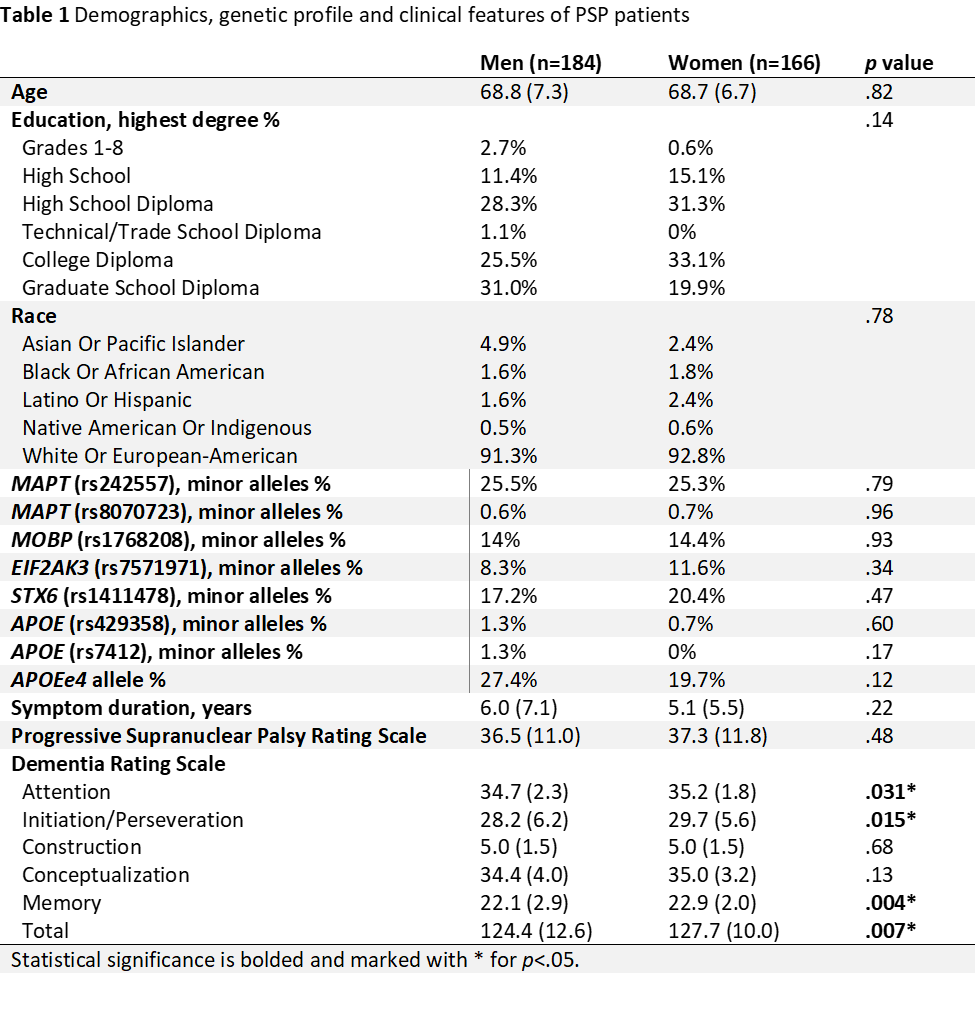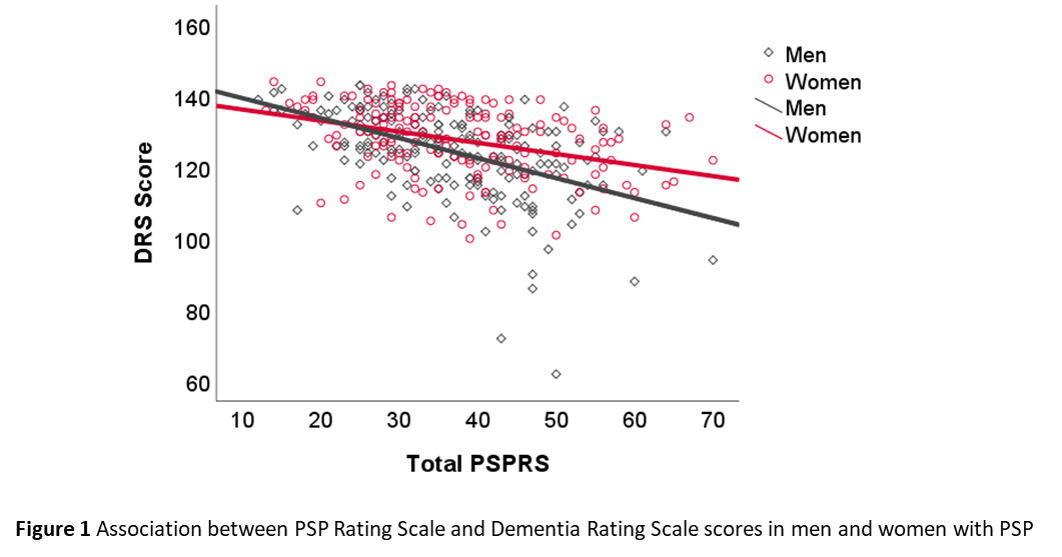Category: Parkinsonism, Atypical: PSP, CBD
Objective: (1) To evaluate the cognitive differences between men and women with progressive supranuclear palsy (PSP) and (2) to investigate whether sex has an effect on PSP-related cognitive decline.
Background: Cognitive impairment is one of the core features of PSP diagnosis (1), which can be common at disease onset, and worsen with disease progression (2). Although sex differences have not been found for motor features of PSP (3), they are commonly reported in other neurodegenerative disorders leading to dementia (4), and estrogen exposure is protective in PSP (5). Cognitive impairment in PSP correlates with tau burden (6) and clinical expression of tau pathology differs between women and men in Alzheimer disease (7). However, the potential modulatory effect of sex on cognition in PSP has not been investigated.
Method: Data from the cross-sectional ENGENE-PSP was used (184 men and 166 women with PSP) (8). Dementia Rating Scale-2 (DRS) was used for cognition, and cognitive impairment was determined using age- and education-corrected norms (9,10). Total and subscale DRS scores were compared between men and women. Disease severity (assessed by total PSPRS) association with cognition was evaluated by linear regression and whether this effect differed by sex was evaluated by moderation analysis including age and education as covariates.
Results: Men and women had similar demographics, genetic profile, symptom duration, total PSP Rating Scale (PSPRS) scores (Table 1). Overall, 67.4% of men and 55.4 % of women were cognitively impaired (p=.021). Men had significantly lower total DRS scores, due to lower Attention, Initiation-Perseveration, and Memory subscores. Higher PSPRS scores (more severe disease) were significantly associated with lower DRS scores for both men (B=-.54, p<.001) and women (B=-.28, p<.001). For a given PSPRS score, men had significantly lower DRS scores than women (p=.013) (Figure 1).
Conclusion: PSP-related cognitive impairment is worse in men than women. Longitudinal studies can elucidate whether cognitive decline rates differ between men and women with PSP. Potential contributing factors for sex differences, such as greater comorbidities in men, and neuroprotective effects of estrogen in women with PSP should also be investigated in detail.
References: 1. Höglinger GU, Respondek G, Stamelou M, Kurz C, Josephs KA, Lang AE, et al. Clinical diagnosis of progressive supranuclear palsy: The movement disorder society criteria. Mov Disord. 2017;32(6):853–64. 2. Arena JE, Weigand SD, Whitwell JL, Hassan A, Eggers SD, Höglinger GU, et al. Progressive supranuclear palsy: progression and survival. J Neurol. 2016 Feb 24;263(2):380–9. 3. Baba Y, Putzke JD, Whaley NR, Wszolek ZK, Uitti RJ. Progressive supranuclear palsy: Phenotypic sex differences in a clinical cohort. Mov Disord. 2006 May;21(5):689–92. 4. Ullah MF, Ahmad A, Bhat SH, Abu-Duhier FM, Barreto GE, Ashraf GM. Impact of sex differences and gender specificity on behavioral characteristics and pathophysiology of neurodegenerative disorders. Neurosci Biobehav Rev. 2019 Jul 1;102:95–105. 5. Park HK, Ilango S, Charriez CM, Checkoway H, Riley D, Standaert DG, et al. Lifetime exposure to estrogen and progressive supranuclear palsy: Environmental and Genetic PSP study. Mov Disord. John Wiley and Sons Inc.; 2018 Mar 1;33(3):468–72. 6. Koga S, Parks A, Kasanuki K, Sanchez-Contreras M, Baker MC, Josephs KA, et al. Cognitive impairment in progressive supranuclear palsy is associated with tau burden. Mov Disord. 2017 Dec;32(12):1772–9. 7. Barnes LL, Wilson RS, Bienias JL, Schneider JA, Evans DA, Bennett DA. Sex differences in the clinical manifestations of Alzheimer disease pathology. Arch Gen Psychiatry. 2005 Jun;62(6):685–91. 8. Litvan I, Lees PSJ, Cunningham CR, Rai SN, Cambon AC, Standaert DG, et al. Environmental and occupational risk factors for progressive supranuclear palsy: Case-control study. Mov Disord. 2016 May;31(5):644–52. 9. Lucas JA, Ivnik RJ, Smith GE, Bohac DL, Tangalos EG, Kokmen E, et al. Normative data for the Mattis Dementia Rating Scale. J Clin Exp Neuropsychol. 1998;20(4):536–47. 10. Rilling LM, Lucas JA, Ivnik RJ, Smith GE, Willis FB, Ferman TJ, et al. Mayo’s older African American normative studies: Norms for the Mattis dementia rating scale. Clin Neuropsychol. 2005 Jun;19(2):229–42.
To cite this abstract in AMA style:
E. Bayram, J. Jankovic, S. Reich, C. Marras, Y. Bordelon, D. Shprecher, R. Dubinsky, I. Litvan. Cognitive Differences Between Men and Women with Progressive Supranuclear Palsy [abstract]. Mov Disord. 2020; 35 (suppl 1). https://www.mdsabstracts.org/abstract/cognitive-differences-between-men-and-women-with-progressive-supranuclear-palsy/. Accessed April 22, 2025.« Back to MDS Virtual Congress 2020
MDS Abstracts - https://www.mdsabstracts.org/abstract/cognitive-differences-between-men-and-women-with-progressive-supranuclear-palsy/


